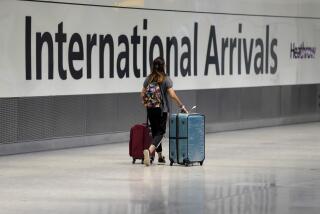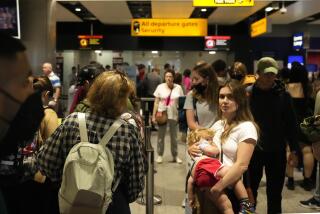The Tide Is Turning Toward Europe
- Share via
Nobody is rushing out to shout it from the rooftops yet, but it’s beginning to look as though demand for European vacations is picking up.
The trend is reflected--albeit modestly--in the airline reservations centers’ telephone traffic flow. The phones may not exactly be ringing off the hook, but at least they’re ringing again.
And the calls are producing bookings, not cancellations as they were four or five months ago. That’s why so many international airline executives are looking a little less glum these days.
It has taken a major effort on the part of both the private sector and European governments to restore hope to what once looked like a hopeless situation. This summer has been a long, painful one for those in the business of promoting travel across the Atlantic.
Money and Thought
It has taken more than just hard work to generate this renewed interest in the Continent on this side of the “pond.” Huge amounts of money have been invested as well, and a lot of thought, some of it fairly basic, some truly creative, has been directed at the problem.
The ways in which the various companies and governments have faced up to the task of encouraging Americans to go from here to there provide an interesting study in destination marketing.
There was, of course, the almost knee-jerk reaction by the airlines; they cut fares. But some industry observers figure if people won’t go to Europe because they’re afraid of terrorism, knocking a hundred bucks off the price isn’t going to help.
Some foreign governments increased their U.S. promotional/advertising budgets by millions of dollars. Others took a different tack, bringing in high-level officials from their homelands to shake hands and make speeches, the way politicians do when they’re trying to get headlines.
Pan Am on Alert
Pan Am looked for a long-term solution, instituting its own beefed-up security program, called Alert, which it reckons is a step ahead of any other airline system in use. And it took the hitherto untried step of advertising and heavily publicizing its tighter security, even though of necessity it kept some of the details secret. Pan Am also offered to share the Alert program with its competitors . . . for a price.
American didn’t buy Pan Am’s plan, but it did introduce tighter security throughout its route system.
British Caledonian called a meeting of prominent members of the United States Tour Operators Assn. to try to find an answer through brainstorming. Whatever was decided at the meeting didn’t produce immediate results but is expected to pay off later, maybe next year.
Massive Giveaway
British Airways literally gave away every seat on its transatlantic services on June 10, about 5,200 in all, in the belief that, if you want to convince people Britain is safe, you have to demonstrate that fact to them. The company also offered prizes for selected passengers on every flight thereafter through the end of summer, ranging from exclusive use of a Concorde for eight hours to the lease of a London town house for five years, and two round-trip tickets a year to help you take advantage of it.
Hertz tripled its sales force in this country.
All of these factors undoubtedly played a part--maybe only a small one, but a part--in helping restore confidence in Europe and getting Americans to travel again.
But, when all is said and done, probably the thing that’s meant most has been the absence of a major terrorist incident for the last few months. Tension seems, touch wood, to have lessened.
Robert Whitley, the executive director of USTOA, the trade association of tour packagers, said recently that Americans have a 90-day memory. He may be right.
It’s very easy, and very natural, to develop and maintain a negative outlook when you’re bombarded daily by newspaper and television reports of all sorts of nasty goings-on. And it’s almost as easy, and certainly as natural, for that outlook to improve when the media coverage slacks off.
More Comfortable
And that’s what’s happened. Americans in general do feel more comfortable now with the idea of travel to Europe than they did at the start of the summer.
It’s too late now, of course, to salvage the entire season for the airlines and hotels and others in the business of selling travel to Europe from the United States.
If the rest of 1986 produced record levels of demand, the year would still be down compared with 1985. But we’re seeing some progress, and any sign of progress is encouraging.
If things keep going the way they appear, it may not, after all, be 1989, or even 1988, before transatlantic traffic is back to normal, as some of the more pessimistic commentators have forecast.
Who knows? Maybe 1987 will be the year that Europe gets healthy again.
More to Read
Inside the business of entertainment
The Wide Shot brings you news, analysis and insights on everything from streaming wars to production — and what it all means for the future.
You may occasionally receive promotional content from the Los Angeles Times.










